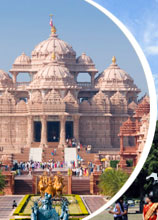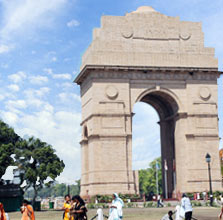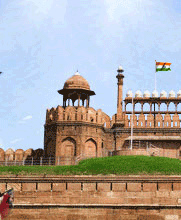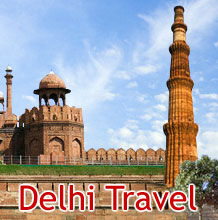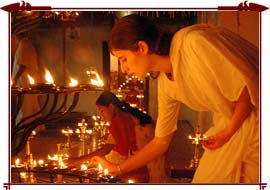 The
festivals of Delhi provide the Delhites with a much-needed break from
the routine and monotonous city life. Numerous festivals are celebrated
in this capital city. Since it is a melting pot of different religions
and cultures, Delhi celebrates almost all the festivals that are
celebrated in other parts of the country. From the Diwali of the Hindus
to the Eid of the Muslims to the Christmas of the Christians to the Guru
Nank Jayanti of the Sikhs, each and every festival is celebrated in
Delhi. Throughout the year, the city remains immersed in the
festivities. However, the festivals of New Delhi, India do get an
additional touch of the city when they are celebrated here.
The
festivals of Delhi provide the Delhites with a much-needed break from
the routine and monotonous city life. Numerous festivals are celebrated
in this capital city. Since it is a melting pot of different religions
and cultures, Delhi celebrates almost all the festivals that are
celebrated in other parts of the country. From the Diwali of the Hindus
to the Eid of the Muslims to the Christmas of the Christians to the Guru
Nank Jayanti of the Sikhs, each and every festival is celebrated in
Delhi. Throughout the year, the city remains immersed in the
festivities. However, the festivals of New Delhi, India do get an
additional touch of the city when they are celebrated here.Some of the major festivals of Delhi are:
Bhai Dooj Festival
Bhai Dooj Festival is celebrated in the month of October or November. The date is not fixed and is calculated every year by the Pandits. It falls on the new moon night, approximately one day after the festival of Diwali. The name Bhai Dooj, with "bhai" meaning brother and "dooj" meaning the second day after the new moon (the day of the festival), literally means the day of the brother. Bhai Dooj is also known as the festival of Tikka.
Chhat Festival
The Chhath Festival is basically a major festival of Bihar, but is celebrated with equal devotion in Delhi as well. This festival, which honors the Sun God, is celebrated six days after the festival of Diwali. The Chhath puja celebrations do not include much fanfare, rather, it is a festival of prayer and propitiation that is undertaken with somberness.
Christmas in Delhi
Christmas is celebrated every year on 25th December. It commemorates the birth anniversary of Jesus Christ, the founder of Christianity. Conventionally, it involves decorating a fir tree, singing Christmas carols and exchanging gifts with loved ones. The main celebrations of Christmas take place on the Christmas Eve, that is December 24.
Diwali Festival
Diwali Festival is also known by the name of "the festival of lights". One of the major Hindu festivals, it is celebrated almost in each and every city of India. There is a legend associated with this festival. It is believed that Demon King Ravana had kidnapped Sita Mata, the wife of Lord Rama, while they were undergoing their 14 years of exile.
Durga Puja Festival
Durga Puja festival is one of the major festivals celebrated by the Bengalis. The festival is dedicated to Ma Durga, the Goddess of power, also known as Shakti. It is believed that festival of Durga Puja commemorates the victory of the goddess over the demon Mahishasura.
Dussehra Festival
Hindus throughout India celebrate Dussehra Festival, although by different names. Also known as Vijaya Dashmi ('Vijay' meaning 'victory' and 'Dashmi meaning 'tenth day'), Dussehra festival has a number of legends associated with it. It is believed that it was on this day that Lord Rama killed the demon king Ravana and took over his empire, Lanka.
Eid Festival
Eid festival has a lot of significance for Muslims all over the world. The celebration of this festivitiy takes place twice a year. According to the Muslim calendar, for the first time Eid falls somewhere around the month of Zil-Haji and is known as Eid-ul-Zuha. Eid-ul-Zuha celebrations in New Delhi, the capital of India, take place with great pomp and show. .
Guru Nanak Jayanti
Guru Nanak Jayanti festival commemorates the birthday of Guru Nanak Dev the founder of the Sikh faith. Guru Nanak Dev was born in the Hindu Month of Kartik (October-November) in 1469 AD at Talvandi, almost 30 miles from Lahore. Sikhs celebrate the birthdays of all the ten gurus and call them Gurpurabs.
Holi Festival
Holi festival is celebrated in the Hindu month of Phagun (Month), on a full moon day. It is the festival of colors and involves smearing each other with gulal (colors) and throwing water on each other. There are a number of legends associated with the origin of the Hindu festival of Holi. One legend has it that on this day Holika, an evil demoness, tried to burn Prahlad, a devotee of Lord Vishnu.
Independence Day
Independence Day in India commemorates 15th August, the day on which India attained independence. After remaining under British rule for over 100 years, India finally regained freedom in the year 1947. Declared a National holiday, the Independence Day is celebrated throughout the country with much fanfare and gaiety.
Janmashtami Festival
Janmashtami Festival is celebrated to commemorate the birth anniversary of Lord Krishna. It falls in the month of August or September, with the date being calculated every year. On the day of Janmashtami, people fast until midnight and thereafter worship the image or statute of Lord Krishna at home or temple. .
Lohri Festival
Lohri Festival is celebrated every year on 13th of January (Hindu month of Paush or Magh). It is the harvest festival of Punjab, which welcomes the onset of spring season and the end of the winter season. The festival of Lohri marks the entry of the sun in the rashi (zodiac) of Makara (Capricorn).
Muharram Festival
Muharram festival is celebrated to honor the martyrdom of Hazrat Imam Hussain, the grandson of the Holy Prophet. The festival begins on the first day of Muharram, the first month of the Islamic calendar and lasts for 10 days.
Navratri Festival
Navratri Festival is regarded as one of the most holy and revered festivals of the Hindus. Lasting for a period of nine days, the festival is dedicated to Goddess Shakti. Also known as the Divine Mother, the Goddess assumes many forms. Three of her forms consist of Goddess Durga (destructive), Goddess Lakshmi (protective) and Goddess Saraswati (knowledge).
Raksha Bandhan Festival
Raksha Bandhan festival is celebrated amongst Hindus throughout the world. The festival of Raksha Bandhan celebrates love and affection between a brother and sister. It falls in the Hindu month of Shravan (generally August). However, the date is not fixed and is calculated every year.
Republic Day
Republic Day commemorates the adoption of the constitution of India. On 26th January 1950 India adopted its new constitution and became a Republic. From that year onwards, 26th January is celebrated as the Republic day of India every year. The day has been declared a National holiday since then and all the commercial as well as educational establishments observe holiday.
Maha Shivratri Festival
Maha Shivratri Festival is celebrated in honor of Lord Shiva and it is believed that Lord Shiva got married to Parvati on this day. Mahashivaratri is celebrated on the 13th (or 14th) day of the dark half of Hindu Month of Phalgun (February-March). As the name "Shivratri" means "the night of Shiva", this festival is celebrated generally at night.

